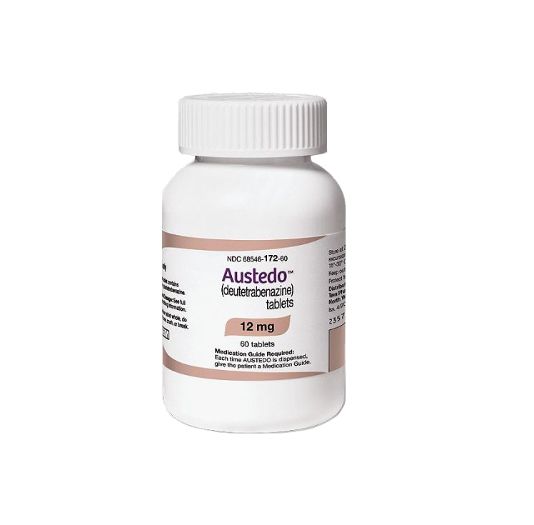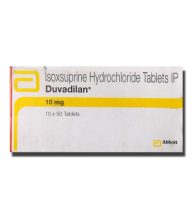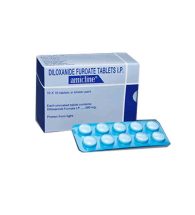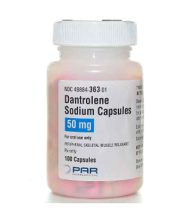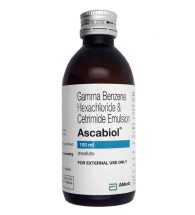Austedo 12mg
Description
What is Austedo (deutetrabenazine) for?
Austedo (deutetrabenazine) is a prescription used to treat grown-ups with chorea related with Huntington’s malady and tardive dyskinesia1.
Chorea is a turmoil portrayed by brief, sudden, sporadic, flighty, non-stereotyped developments which can influence different body parts, and meddle with discourse, gulping, pose and gait2.
Tardive dyskinesia is a crippling and regularly irreversible development issue portrayed by redundant and wild developments of the tongue, lips, face, trunk, and furthest points. It tends to be brought about by specific drugs used to treat psychological well-being conditions or gastrointestinal conditions3.
How does Austedo (deutetrabenazine) work?
Austedo (deutetrabenazine) is a vesicular monoamine transporter 2 (VMAT2) inhibitor1. A VMAT2 is a protein basic for the arrival of synapses into the synaptic separated — the space between neurons where the correspondence between neurons takes place6. The exact instrument by which Austedo (deutetrabenazine) applies its enemy of chorea impacts is obscure however it is relied upon to clear the nerve terminals from synapses like dopamine, serotonin, norepinephrine, and histamine. This reversible impact is by all accounts in charge of decreasing chorea and tardive dyskinesia1.
Austedo (deutetrabenazine) is the second item endorsed for the treatment of Huntington’s Disease, the other one being tetrabenazine4. The two meds have a fundamentally the same as component of activity. The fundamental distinction between the two is that Austedo (deutetrabenazine) is processed all the more gradually and in this manner empowers less continuous and bring down every day portions, accomplishing a similar impact while bringing down the danger of reactions. Contrasted and tetrabenazine, deutetrabenazine has, in this manner, an enhanced hazard advantage profile5.
Is Austedo (deutetrabenazine) endorsed?
Austedo (deutetrabenazine) was endorsed by:
Sustenance and Drug Administration (FDA) (USA):
April 3, 2017 (chorea related with Huntington’s Disease4)
August 30, 2017 (treatment of Tardive Dyskinesia3)
How would I take Austedo (deutetrabenazine)?
The portion of Austedo (deutetrabenazine) is resolved for every patient dependent on the decrease of chorea or tardive dyskinesia, and tolerability1.
The suggested beginning portion of Austedo (deutetrabenazine) is:
6 mg controlled orally once every day for patients with Huntington’s sickness
12 mg for each day (6 mg twice every day) for patients with tardive dyskinesia.
The dose must be balanced by the patient’s treatment history.
Patients who are not changing from tetrabenazine
At the point when recommended to patients who are not being changed from tetrabenazine (a related VMAT2 inhibitor)1:
increment the portion at week by week interims in additions of 6 mg for each day to a most extreme prescribed everyday measurement of 48 mg
all out everyday measurements of 12 mg or above ought to be managed in two isolated dosages
regulate with nourishment and gulp down. Try not to bite, pound, or break tablets.
Patients who are changing from tetrabenazine
Patients who are taking tetrabenazine and are changing to Austedo (deutetrabenazine) should cease tetrabenazine and start Austedo the next day. The suggested introductory dosing relies upon the current tetrabenazine everyday measurements. Definite data can be found on the FDA official recommending data on page 21.
Complete data about Austedo (deutetrabenazine) measurement and organization can be found in the assets section1.
Cautioning: Austedo (deutetrabenazine) can expand the danger of despondency and self-destructive musings and conduct in patients with Huntington’s malady. Anybody considering the utilization of Austedo (deutetrabenazine) must adjust the dangers of discouragement and suicidality with the clinical requirement for treatment of chorea. Intently screen patients for the development or intensifying of misery, suicidality, or unordinary changes in conduct. Patients, their guardians, and families ought to be educated of the danger of sadness and suicidality and ought to be told to report practices of concern expeditiously to the treating physician1.
Note: Please counsel with your treating specialist for customized dosing.
Are there any known unfriendly responses or reactions of Austedo (deutetrabenazine)?
Basic antagonistic responses
Chorea related with Huntington’s Disease
The most widely recognized unfriendly responses happening in over 8% of Austedo-treated patients1 for chorea related with Huntington’s illness were:
sluggishness
loose bowels
dry mouth
weariness.
There was no distinction in the quantity of antagonistic occasions among the two gatherings in general and inside mental and sensory system regions, with genuine unfavorable occasions in a single patient for every group5.
Tardive Dyskinesia
The most well-known antagonistic responses happening in over 8% of Austedo-treated patients1 for Tardive Dyskinesia1 were:
nasopharyngitis
a sleeping disorder.
Genuine antagonistic responses
The genuine antagonistic responses recorded in the recommending data include:
expands the danger of sorrow and self-destructive musings and conduct (suicidality)
in patients with Huntington’s infection
QT Prolongation (unusual heart cadence)
neuroleptic harmful disorder (NMS)
akathisia, disturbance, fretfulness, and parkinsonism
sedation/sluggishness.
Use in a particular populace
Austedo (deutetrabenazine) can be deadly for a hatchling.”

